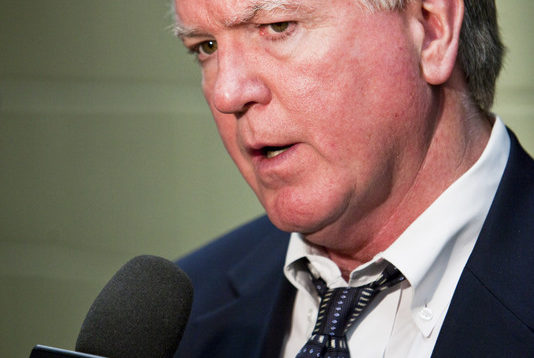by Jordan Clancy
In March, Laurentian University was scheduled to host Making the Play: A panel discussion on the importance of allyship and inclusion in sport with Brian Burke and Brock McGillis. The panel was cancelled due to COVID-19, but Burke’s message is still important, especially during June’s LGBTQ2+ Pride month.
LGBTQ2+ allyship hits close to home for Brian Burke, a former National Hockey League (NHL) executive and current NHL media analyst. Burke’s journey started with his son Brendan, who came out as gay, on a December night in 2007.
“Brendan said, ‘I need to talk to you’ and I said, ‘We’ll talk in the morning.’ He said, ‘No we need to talk right now. I’m gay’”.
“I said, ‘Are you sure?’ Because there’s a questioning phase some people go through.’”
“And he said ‘Yes’, and I said ‘Okay’ and I hugged him.”
Burke told his son that coming out wouldn’t change anything between them.
“It was a non-event in our house. That’s how I raised my kids. I raised my kids with acceptance.”
Burke is well-known around the NHL for his macho image and his old-school mentality. Burke said this image has a lot to do with the impact he had on the world of sports.
“I’m a guy that drove a pickup truck, chewed tobacco, rode a Harley and I’m a big pro-fighting guy. I’m about as old-school as they can get,” Burke said.
“And if it was fine with me to have a gay son, I think a lot of people thought, that’s the guy we would have guessed to have a different view. So, I think my personal role in hockey has been helpful in terms of the message – that it’s okay.”
The message that Burke hopes to send out when discussing the importance of LGBTQ2+ allyship and inclusion remains the same, no matter who he speaks to.
“The message is, the [LGBTQ2+] community needs your help. This community needs your acceptance, this community needs to move toward equality. You can be a part of the solution. My message never changes.”
Today marks ten years since losing my son Brendan (pictured at right with my son Patrick on the left) and we miss him every single day. Love you B and the legacy you left behind for LGBTQ+ people in sports ❤️ pic.twitter.com/ygXGDpKEj9
— Brian Burke (@Burkie2020) February 5, 2020
Burke’s son Brendan died in a tragic car accident in 2010, at the age of 21.
In honour of Brendan and his work to diminish homophobia in hockey, Brian and his son Patrick, founded “You Can Play” in 2012 – a social activism campaign committed to combating homophobia in sports.
The campaign, Burke said, was primarily aimed at male team sport athletes.
“Female team sport athletes have never had the same level of rejection, hatred and anger that male team sport athletes have had,” He said.
“This is where part of the message begins. Brenden was the hockey player, they [other players] used very homophobic language, and it made him very uncomfortable.”
“[The campaign] was an effort to get NHL players to say, hey, if you can play, you can play. I don’t care who you go home with, I don’t care what church you go to on Sunday. You can help my team. You belong here.”
“It’s a powerful message from the macho NHL guys that everyone figured would never be allies.”
‘Far away from equality’
While Burke explains that society has made progress in terms of equality for the LGBTQ2+ community, there is still a lot of work to be done.
“We’ve made phenomenal progress, but we’re so far away from equality,” Burke said. “We still have a significant battle to fight here. We’re not anywhere near the finish line.”
“The fact of the matter is that these biases and these prejudices aren’t doors to be kicked in. These are mud walls that crumble over decades.”
When asked about the next step for sports leagues to combat homophobia, whether it be at the university or professional level, Burke emphasized the importance of education and punishment.
“Continue the education in sports, continue punishing bad behaviours and punish athletes who cross the line, in all sports.”
“When I was a player, you could say whatever you wanted to somebody as a homophobic insult. No one would bat an eye, and now you get suspended for it,” He added.
“Continue supporting You Can Play and other charities [and campaigns], continue having pride nights.”
Burke said leagues around the world are doing a “great job,” so far.
“We’ve just got to keep going,” Burke said.
“If your heart’s in the right place, it shouldn’t be a struggle.”
